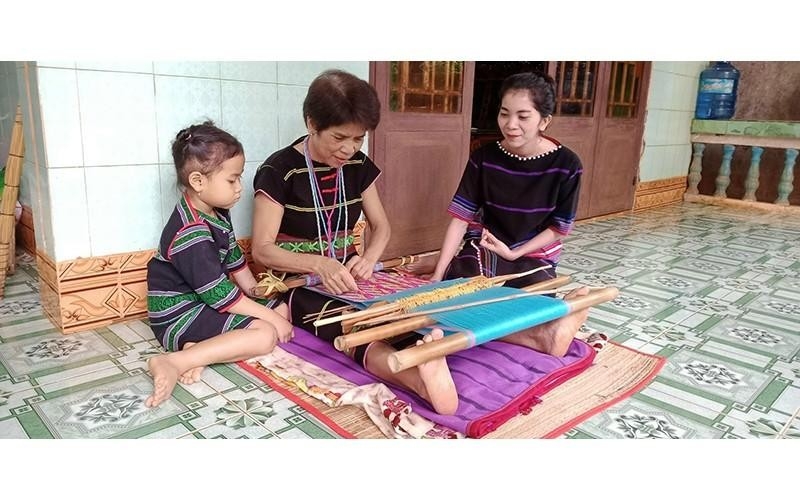Vietnam announces 10 more national intangible cultural heritages
ABO/NDO - The Ministry of Culture, Sports and Tourism has issued a decision to add 10 additional national intangible cultural heritages.
 |
| Artisan Thi An De (Tho Son Commune, Bu Dang District, Binh Phuoc Province) transfers her knowledge of traditional brocade weaving to her descendants. (Photo: NHAT SON). |
The newly recognised national intangible cultural heritages include brocade weaving of the M'Nong people (in Bu Gia Map Commune, Bu Gia Map District, Dak Nhau Commune, Dong Nai Commune, Tho Son Commune, Phu Son Commune, and Bu Dang District, in Binh Phuoc Province); Chua Ba Festival - Thi Nai - Nuoc Man Commercial Port (Phuoc Quang Commune, Tuy Phuoc District, Binh Dinh Province); 'klei duê' ( lyrical genre of literature) of the Ede people (Cu M'gar District, Dak Lak Province); the longevity ceremony of the M'Nong people (Lak District, Dak Lak Province); Ba Trieu Temple Festival (Trieu Loc Commune, Hau Loc District, Thanh Hoa Province); Muong Xia Festival (Son Thuy Commune, Quan Son District, Thanh Hoa Province); 'bua sac' (Tet greeting) singing of the Muong people (Ngoc Lac District, Thanh Hoa Province); the Dai Phan ceremony of the San Diu people (Tuyen Quang Province); the decorative art on costumes of the Mong Hoa people (Lam Binh District, Ham Yen District, Chiem Hoa District, Na Hang District, and Yen Son District, Tuyen Quang Province); and tofu making craft (My Hoa Commune, Binh Minh Town, Vinh Long Province).
These recognised intangible cultural heritages have been divided into the four categories of traditional handicrafts, traditional festivals, social practices and beliefs, and folklore knowledge.
The ministry has assigned the authorities at all levels in localities where intangible cultural heritages are located to be responsible for the management of the heritages within the scope of their duties and in accordance with the law and regulations on cultural heritages.
(Source: NDO)
 về đầu trang
về đầu trang







